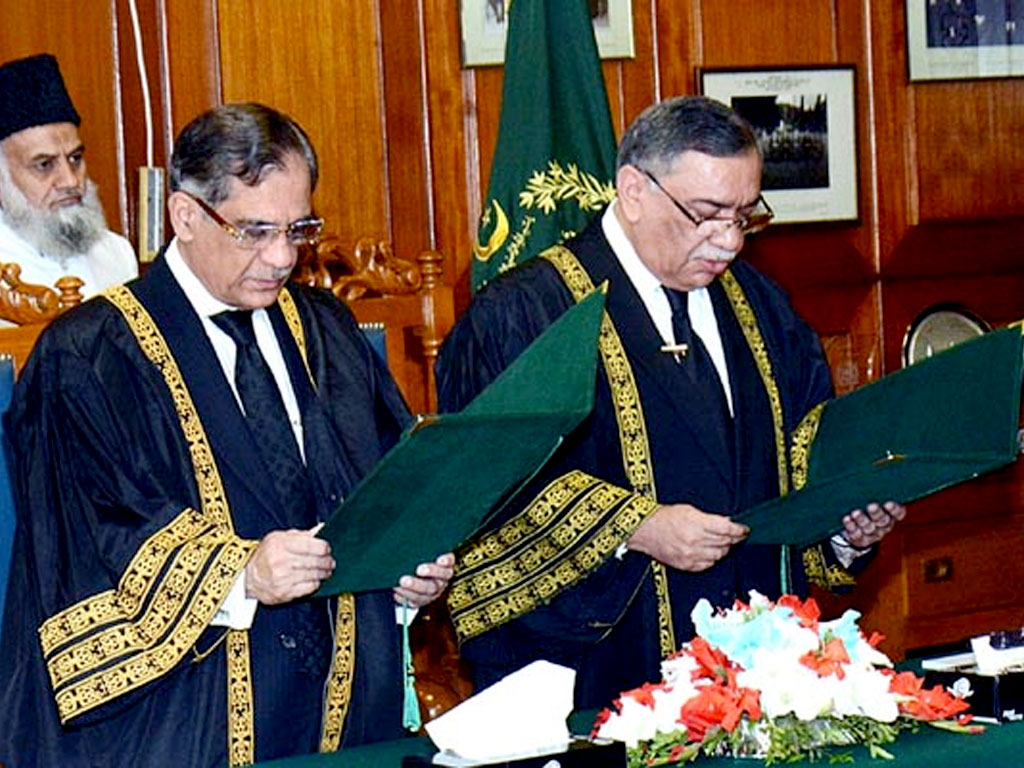After 20 months as Pakistan’s top judge, Ata Bandial will make way for chief justice-designate Justice Qazi Faez Isa who is set to take oath to his office today (Sunday).
Constitutionally, a chief justice retires after reaching the age of 65, also called the age of superannuation. After retirement, the senior-most judge becomes the chief justice.
As Justice Bandial bid farewell, here is a list of Pakistan’s seven previous CJPs and some of their renowned judgments.
Justice Gulzar Ahmed

Born on February 2, 1957 in Karachi, Justice Gulzar got his early education from Gulistan School, Karachi, BA Degree from Government National College, Karachi and LLB degree from SM Law College, Karachi.
Having enrolled as advocate of the High Court in 1988 and of the Supreme Court in 2001, he was elected as Honorary Secretary of the Sindh High Court Bar Association for the year 1999-2000.
In 2002, he was elevated as Judge of Sindh High Court on August 27, 2002, notified as Senior Puisne Judge of the same court and later elevated as Judge of the Supreme Court of Pakistan on November 16, 2011. He had also served as Acting Chief Justice of Pakistan from November 20-28, 2018 and May 13-17, 2019.
Justice Asif Saeed Khan Khosa

Justice Khosa took oath as the 26th CJP on January 18, 2019.
Judge Khosa was elevated to the position of a Supreme Court judge on February 18, 2010. He was a part of the bench that disqualified Nawaz Sharif from the prime minister post in 2017.
Judge Khosa was also part of the SC bench that acquitted Asia Bibi, a Christian woman who was sentenced to death for blasphemy.
Justice Mian Saqib Nisar

In April 2016, Nisar served as the acting CJP in the absence of Chief Justice Jamali who had gone to Turkey on a seven-day official visit. On December 31, 2016, he was administered oath by then-President Mamnoon Hussain.
Justice Mian Saqib Nisar was born on January 18, 1954 in Lahore. He completed his matriculation from Cathedral High School, Lahore and graduation from Government College, Lahore.
Following his retirement, the ex-CJP became embroiled in controversy after a former Gilgit-Baltistan chief justice was quoted as saying that he witnessed Nisar instructing a high court judge to not release Maryam Nawaz and Nawaz Sharif in the corruption references against them.
Nisar had rubbished the report and in 2022, the former GB judge completely disowned the affidavit and withdrew from its contents.
Justice Anwar Zaheer Jamali

On September 10, 2015, Justice Jamali was administered oath by then-President Mamnoon Hussain.
Chief Justice Jamali completed his Bachelors’ Degrees in Commerce and Law from the University of Sindh in 1971 and 1973, respectively.
He was also nominated as the acting chief of the Election Commission of Pakistan in July 2014.
He was among those judges who refused to take a fresh oath under the Provisional Constitution Order (PCO) in 2007.
On August 27, 2008, he was reappointed as Judge and Chief Justice High Court of Sindh and elevated as a Judge of the Supreme Court in August 2009.
Justice Jawwad S. Khawaja

In August 2015, Justice Jawwad S Khawaja took charge as head of the SC for a brief period of 24 days.
He took his oath in Urdu and he is also the first judge in the history of Pakistan whose appointment order is not in English.
Justice Khawaja was the first judge to resign in protest from the high court in March 2007 after then-President Pervez Musharraf virtually suspended the then chief justice of Pakistan, Chaudhry Iftikhar, and appointed Justice Javed Iqbal, as the acting Chief Justice of the apex court.
Justice Khawaja was born on September 10, 1950 in Wazirabad and obtained a degree in law from Punjab University.
He received an LLM from University of Berkeley, California and taught at Lahore University of Management Sciences (Lums) until he was appointed as the Judge of Supreme Court in 2009.
Justice Nasirul Mulk

In July 2014, Justice Nasir-ul-Mulk took oath as 22nd Chief Justice of Pakistan.
Justice Mulk belongs to Swat, Khyber Pakhtunkhwa and did his Bar-at-Law from the Inner Temple, London in 1976.
Before his appointment as judge of the Peshawar High Court on June 4, 1994, he served as the top legal officer of the province for one year.
He was elevated to the post of Chief Justice of Peshawar High Court on May 31, 2004 and as a Supreme Court Judge on April 5, 2005.
Justice Mulk led a seven-member bench that sentenced former Prime Minister Yousuf Raza Gilani till the rising of the court in a contempt of court matter over his refusal to write a letter to Swiss authorities to reopen cases against the then President Asif Ali Zardari.
Justice Tassaduq Hussain Jillani

In December 2013, Tassaduq Hussain Jillani took oath as the CJP and remained in the role of chief justice for six months and 24 days.
Jillani was born on July, 6, 1949, and did Masters in Political Science from Forman Christian College, Lahore. LL.B., from the University of Punjab, Lahore.
He completed a course in Constitutional Law from the University of London in the Institute of Advance Legal Studies.
He was awarded ‘Key of the City of Detroit (Michigan)’ by the Mayor at a function, on 12th of October, 2007, conferred ‘Honorary Doctorate in Humane Letters’ at a special Convocation held in Southern Virginia University, Washington, and conferred the Honorary Chair by the American Bar on its ‘The World Justice Project’ – an Initiative to promote the rule of law the world over.
























Comments
Comments are closed.